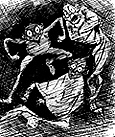
| "The cat's tail is only an encumbrance to her, yet she thinks it is the most precious thing she's got. Just so with man and his religion." -- Mark Twain 1 |
Working from the notion that the word "religion" is derived from religare, to bind, the beliefs held by Huck and Jim in The Adventures of Huckleberry Finn can be called a religion. Both characters are bound to these beliefs by faith and through them each is bound to a certain perception of the world.
Early in the story, Huck investigates Christianity and finds that is comes up short.
| "I set down one time back in the woods, and had a long think about it. I says to myself, if a body can get anything they pray for, why don't Deacon Winn get back the money he lost on pork? Why can't the widow get back her silver snuffbox that was stole? Why can't Miss Watson fat up? No, says I to my self, there ain't nothing in it. I went and told the widow about it, and she said the thing a body could get by praying for it was "spiritual gifts." This was too many for me, but she told me what she meant -- I must help other people, and do everything I could for other people, and look out for them all the time, and never think about myself. This was including Miss Watson, as I took it. I went out in the woods and turned it over in my mind a long time, but I couldn't see no advantage about it -- except for the other people; so at last I reckoned I wouldn't worry about it any more, but just let it go." |
This rejection is justified again and again as Huck's adventures unfold. Although the Widow and Miss Watson "fetch the niggers in for prayers," her piety does not prevent Miss Watson from giving thought to selling Jim down the river. The Shephersons and Grangerfords attend church and praise the sermon about brotherly love, all the time with their guns at their sides.
On the other hand, all that Huck observes seems to confirm the truth of the beliefs he shares with Jim.
Huck Finn's adventures begin with the death of a spider. Feeling lonesome and cheerless, he sits at his window listening to the supernatural world around him. An owl, a whippoorwill, and a dog are all talking of the dead and the dying, the wind is whispering incoherently; a ghost is thwarted in an attempt to communicate. Suddenly a spider appears on Huck's shoulder, and he inadvertently send him into the candle's flame. Huck tells us, "I didn't need anybody to tell me that that was an awful bad sign and would fetch me some bad luck;" his fear is so intense that it "most shook the clothes off me" (HF, 4.)
His bad luck continues with the spilling of the salt, "I reached for some of it as quick as I could, to throw over my left shoulder and keep off the bad luck, but Miss Watson was in ahead of me, and crossed me off" (HF, 18.) Huck is right to feel "worried and shaky" because immediately upon leaving the house, he finds evidence that Pap has returned.
When Huck touches the snake-skin during the flood, Jim reads it as a sign of bad luck to come. Because right afterward they find the house floating down the river and collect such an amount of bounty, Huck doubts Jim's prediction of bad luck, "You said it was the worst bad luck in the world to touch a snake-skin with my hands. Well here's your bad luck! We've raked in all this truck and eight dollars besides. I wish we could have bad luck like this every day, Jim." (HF,63) We and Huck find out later that the house also contained his father's body. And more misfortune will follow.
The next event is Jim's snake-bite. Huck has killed a rattlesnake and, as a joke, laid it on Jim's blanket. When they return to the cave, the dead snake's mate is there and bites Jim. Huck kills the mate and tells us he "throwed the snakes clear away amongst the bushes; for I warn't going to let Jim find out it was all my fault, not if I could help it." (HF,65) But putting the dead snake on Jim's blanket is minor compared with the first sin committed in touching that snake-skin.
Their trials continue, through the separation in the fog, the close call with the search party, learning they've missed Cairo, and finally losing the canoe, at which Huck says, "we both knowed well enough it was some more work of the rattle-snake skin."
| "Anybody that don't believe yet, that it's foolishness to handle a snake-skin, after all that that snake-skin done for us, will believe it now, if they read on and see what more it done for us." |

NOTES:
1. From Mark Twain's Views of Religion, by Caroline Thomas Harnsberger.
Back to text